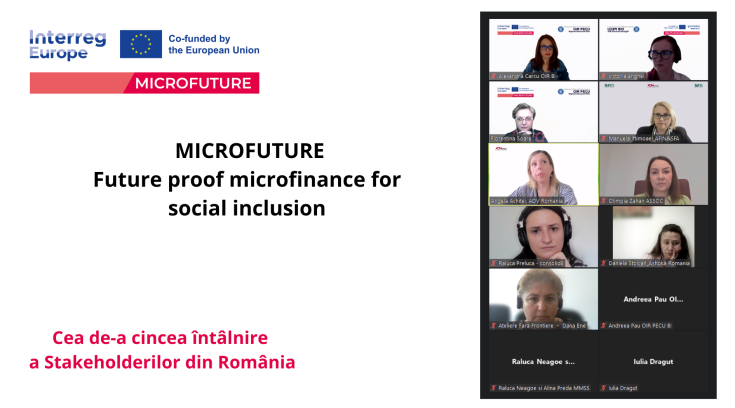5th Stakeholder meeting held in Romania
On June 4, 2025, the fifth online stakeholder event of the MICROFUTURE – Future-proof microfinance for social inclusion project took place. This strategic European project is funded through the Interreg Europe programme. The main goal of the event was to explore the challenges and opportunities related to a new financial instrument that combines a loan with a grant, specifically designed for social enterprises.
Event Objective
Under the theme “Navigating Challenges and Opportunities Toward the Impact of Microcredit in the Social Economy”, the event brought together key actors in the social economy field, representatives of public institutions, microfinance experts and potential beneficiaries of the new financial instrument. Discussions focused on validating this innovative tool and identifying optimal ways to implement and promote it.
Agenda and Key Contributions
Among the keynote speakers were:
- Angela Achiței, President of the “Alături de Voi” Romania Foundation (ADV), who presented the objectives of the social impact study linked to the new financial instrument. The study aims to assess the utility of loans, identify access-related challenges, and propose strategic adjustments to improve efficiency.
- Olimpia Zahan, representative of the ASSOC Association, offered a practical perspective from a potential beneficiary’s point of view. She highlighted the impact generated by ASSOC-managed social enterprises, including the ASSOC Social Restaurant & Catering, a successful model for integrating vulnerable individuals into the labor market.
Group Discussions
During the interactive group session, participants delved deeper into the event’s central themes. The dialogue was constructive and led to a series of relevant conclusions and recommendations for the future implementation of the financial instrument:
- The most effective methods for promoting the instrument among social enterprises;
- The added value of combining a loan with a grant in a single operation;
- Ways to change the perception of loans, especially among social organizations that are traditionally hesitant to borrow.
General Conclusion
The overarching conclusion was clear: the instrument has the potential to become a real catalyst for the development of the social economy, provided it is effectively promoted, flexibly implemented, and rigorously monitored for social impact.
The stakeholder event within the MICROFUTURE project highlighted that the new financial instrument, which combines a grant with a loan, is perceived as a viable and innovative solution for supporting social enterprises. Participants emphasized the importance of clear and tailored communication to ensure that the benefits of the instrument are well understood and accepted by potential beneficiaries. Traditional reluctance toward credit can be mitigated through complementary measures such as financial education, counseling, and peer learning between organizations at different stages of financial maturity.
It also became evident that monitoring social impact must be a central component of this initiative, with simplified yet relevant evaluation tools capable of reflecting real transformations in the communities served.
Ultimately, the success of this instrument depends on the quality of collaboration among all involved actors – public institutions, funders, social enterprises and support structures – who must work together to create a functional, sustainable ecosystem focused on long-term social inclusion.
About MICROFUTURE
Over the course of eight semesters (2023–2027), the MICROFUTURE project aims to improve national and regional public policies in the field of microfinance for social inclusion. The project brings together 6 partners from 5 European countries and promotes the exchange of best practices, territorial analyses, policy development, and the adaptation of innovative solutions for the social economy.

